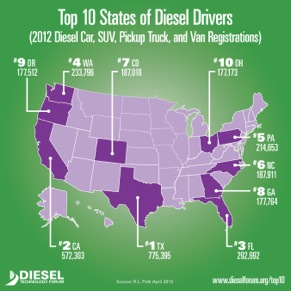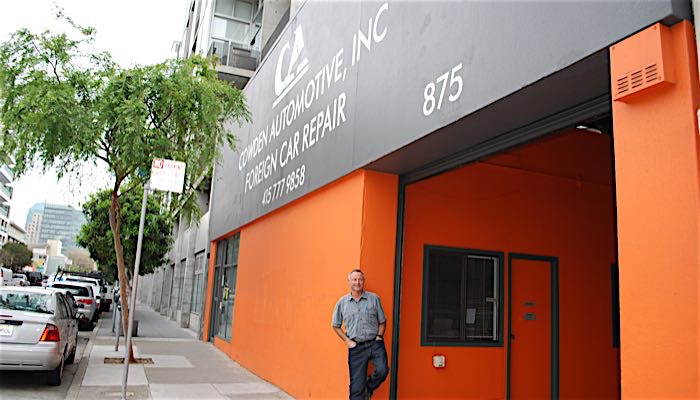 Clean diesel car registrations increased by 24.3 percent in the U.S. from 2010 through 2012, following similar trends of double-digit diesel car sale increases throughout the country, according to new data compiled for the Diesel Technology Forum.
Clean diesel car registrations increased by 24.3 percent in the U.S. from 2010 through 2012, following similar trends of double-digit diesel car sale increases throughout the country, according to new data compiled for the Diesel Technology Forum.
The national registration information was compiled by R.L. Polk and Co. and includes data for all types of passenger vehicles – cars, SUVs, pickup trucks and vans – in all 50 states and the District of Columbia from Jan. 1, 2010, through Dec. 31, 2012.
"This new data of total national vehicle registrations coincides with what we’ve been seeing in the monthly auto sales – clean diesel and hybrid cars are showing consistent and impressive growth patterns in the U.S.," said Allen Schaeffer, the executive director of the Diesel Technology Forum.
"This consistent growth in clean diesel registrations in the past three years is particularly noteworthy since it has occurred during an economic recession, the availability of an extremely large number of fuel-efficient vehicles, which was topped off by some of the highest diesel fuel prices in U.S. history," Schaeffer said. "Even in the face of these significant challenges, diesel buyers are seeing the big picture and long-term value by investing in record numbers of clean diesel cars and SUVs."
Diesel car and SUV registrations increased from 640,779 in 2010 to 796,794 at the end of 2012 – a 24.34 percent increase. During this same period, hybrid car and SUV registrations increased from 1,714,966 to 2,290,903 – a 33.58 percent increase. In contrast, the total car and SUV registrations in the U.S. increased by just 2.75 percent during the same period, according to Polk’s research.
"When all passenger vehicle registrations are included – cars, SUVs, pickup trucks and vans – the diesels currently account for 6,658,399 vehicles while hybrids account for 2,295,500 vehicles throughout the U.S," Schaeffer said, noting that there currently are 27 diesels available in the U.S. market compared to 46 hybrids.
Diesel Vehicle Sales Expected To Increase
"While total diesel vehicle registrations are slightly less than 3 percent in the U.S., auto analysts and market researchers virtually all agree diesel sales are going to increase significantly as the number of new diesels made in available domestically will more than double in the next two years," Schaeffer said. "Some analysts predict diesel sales will reach 10 percent of the U.S. market by 2020.
"In addition, clean diesel vehicle sales are also projected to increase as the U.S. moves toward increasing fuel efficiency standards to 54.5 mpg by 2025," Schaeffer said. "Because clean diesels are 20 to 40 more efficient than gasoline engines, diesel cars and trucks will play a major role in achieving these new standards. And, an interesting wild card will be the emerging market domestically and internationally of clean diesel hybrid vehicles that will achieve astounding mpg numbers."
Texas, California and Florida Currently Have the Most Diesels
Below are the individual state leaders in various vehicle registrations categories. Go here to see national diesel, hybrid and total vehicle registration statistics and Top 10 State lists for diesel and hybrid registrations in these categories.
Fastest Growth All Diesel Passenger Vehicles (2010-12) – Cars, SUVS, Pickup Trucks and Vans:
1. District of Columbia +20%
2. Maine +13%
3. Pennsylvania +11%
Fastest Growth Diesel Cars and SUVs (2010-12):
1. California +55%
2. Massachusetts +45%
3. New York +43%
Fastest Growth Diesel Pickup Trucks (2010-12):
1. Montana +10%
2. Nebraska +9%
Maine +9%
3. Pennsylvania +8%
Fastest Growth Hybrid Cars and SUVS (2010-12):
1. South Carolina +50%
2. Tennessee +48%
3. Kentucky +46
Mississippi +46%
2012 Most Diesel Passenger Vehicles (Cars, SUVs, Pickup Trucks and Vans):
1. Texas 775,395
2. California 572,303
3. Florida 292,692
2012 Highest Percentage of Diesel Passenger Vehicles (Cars, SUVs, Pickup Trucks and Vans):
1. Wyoming 10.5% 63,497 total
2. Montana 7.8% 91,943 total
3. Idaho 6.6% 96,093 total
Alaska 6.6% 42,328 total
2012 Total Hybrid Cars, SUVS, Pickup Trucks and Vans:
1. California 548,199
2. Florida 122,912
3. Texas 121,944
2012 Most Diesel Cars and SUVS:
1. California 84,106
2. Texas 64,272
3. Florida 49,838
2012 Most Diesel Pickup Trucks:
1. Texas 697,904
2. California 461,035
3. Florida 228,762
2012 Highest Percentage of Diesel Pickup Trucks:
1. Wyoming 23.1% 60,960 total
2. Utah 19.4% 118,771 total
3. Montana 18.0% 85,585 total
For more information, visit www.dieselforum.org.

